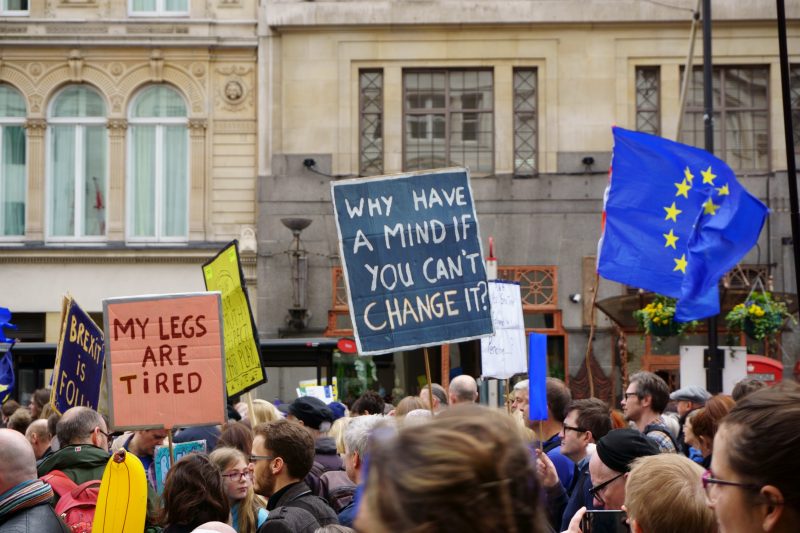Three years after leaving the European Union, polling suggests a majority in the UK would now favour re-joining. However, many points of uncertainty stand in the way of a return to EU membership and navigating them would present a challenge for UK policy-makers, writes Derrick Wyatt.
According to opinion polls, a majority of the British public think Brexit was a mistake and would vote to rejoin the EU. A recent poll indicated that two thirds supported having another referendum on EU membership.
An application for membership from the UK would be received with some satisfaction by many on the EU side. There would be interest in the prospect of the return of the UK as a substantial net contributor to the EU budget, as a G7 economy that would significantly enlarge the EU’s single market, and as a major European military power. But there would be misgivings too.
There are too many uncertainties in the political equation to tell the difference between a missed opportunity and a poisoned chalice.
Increasing UK public support for joining the EU might suggest that Labour’s policy of “making Brexit work” rather than seeking to reverse it – a policy recently confirmed by Keir Starmer at the World Economic Forum – is a missed opportunity.
Yet there are too many uncertainties in the political equation to tell the difference between a missed opportunity and a poisoned chalice. Some of the uncertainties are linked to politics in the UK, while others are linked to how the EU might react to an application for membership from a UK whose commitment to the European project is very much in doubt.
Would the public back EU membership simply on economic grounds?
One uncertainty is whether a majority in the UK would vote – whenever the time comes – for the UK to join the EU simply on the basis that Brexit had made them worse off. Most of the criticism of Brexit has been on the basis that it has caused economic damage to the UK rather than bringing economic benefits. The UK’s independent Office for Budget Responsibility continues to forecast a long-run loss of productivity of 4 per cent as a result of Brexit.
But people base their economic assessments on their own experience rather than on OBR analyses. If the economy picks up and people feel better off in 2024 or beyond, Brexit might have a diminishing effect on voting intentions.
It is possible that any majority in opinion polls favourable to joining the EU might narrow in the heated debate that would follow if EU membership became one of the dividing lines between the UK’s major political parties. This brings us to another uncertainty. Would such a debate highlight issues that might detract from a simple narrative that reversing Brexit would put more money in our pockets? One such issue would be joining the euro.
Joining the euro has never been popular in the UK
Even when pro-euro Labour prime minister Tony Blair was in office, opinion polls showed that those against joining the euro outnumbered those in favour by large margins. Scotland voted to remain, but in Scotland the euro is nevertheless unpopular. The realistic assumption is that the UK would not secure another opt-out from joining the euro but would instead have to legally commit to join at some stage.
On the other hand, seven out of the EU’s 27 member states still haven’t signed up to the euro, though Bulgaria and Romania plan to soon. No legal steps have yet been taken against a country for not doing enough to join the euro, but no UK political party could guarantee that no such steps would ever be taken. What a UK political party could do would be to pledge that in government they would never agree to the UK joining the euro. That might reassure some voters but complicate joining the EU.
UK voters might be sceptical about joint EU debt
Another issue likely to arise is the question of the UK becoming liable for the debt of other member states. This debt would be raised by bonds issued by the EU and guaranteed by all member states. As well as member states underwriting repayment of such common debt, they would pay interest on it via increased contributions to the EU budget.
The only precedent for EU common debt so far is the 850-billion-euro recovery fund adopted in the wake of the pandemic and initially requested by over-indebted Spain and Italy. Originally described by then German finance minister Olaf Scholz as a one-off, the EU might well find itself turning to common debt to finance the reconstruction of Ukraine once the conflict is over, whenever that might be. In March 2022, French President Emmanuel Macron refused to rule out future joint EU debt to finance “strategic investments” on defence and climate change. It is likely that common debt will feature in the EU’s financial architecture in coming years.
Common debt requires unanimity. Some UK political parties might pledge to block future EU joint debt initiatives if the UK did join the EU. Although it’s unclear how this would play out, the joint debt issue has the potential to dissuade some British people from voting to re-join the EU.
Would signs of UK exceptionalism ring alarm bells in Europe?
Yet another uncertainty is the reaction of the EU to the UK’s internal political debates. The EU would certainly want to see a strong and settled majority across the UK in favour of joining the EU, combined with the support of UK-wide political parties. But if the support of UK political parties was qualified by pledges not to join the euro, that might be interpreted by the EU as an early warning sign that UK exceptionalism was still alive and kicking. And if pledges not to join the euro were accompanied by pledges to block future common debt, alarm bells could start ringing in earnest. Some member states might favour the option of common debt to support their overstretched finances over a return of the UK. In such circumstances, unanimous support for a UK return to the EU could not be guaranteed.
If the support of UK political parties was qualified by pledges not to join the euro, that might be interpreted by the EU as a sign that UK exceptionalism was still alive and kicking.
Another friction point for a UK application to join the EU would be the EU’s need to reform its decision-making in order to make it possible to admit new member states – quite apart from any readmission of the UK.
In 2022, the EU fast-tracked applications for EU membership by Ukraine, Moldova and Georgia, and Ukraine, Moldova and Bosnia and Herzegovina were given EU candidate status. They have joined existing candidates Albania, North Macedonia, Montenegro , Serbia and, in theory, Turkey, though the latter is unlikely to ever join the EU.
France and Germany want reform of EU decision-making before enlargement to avoid the regular deadlocks that might otherwise result from yet more member states with the ability to block certain decisions with a national veto. This reform would entail the abolition of national vetoes on issues such as international sanctions and tax. In June 2022, the European Parliament submitted proposals to the European Council for Treaty revision covering a range of issues, including an expansion of EU powers and the powers of the Parliament itself, and the abolition of national vetoes.
Some member states might see the return of the UK as an obstacle to the reforms that would make further EU enlargement possible, because the UK would be likely to block the abolition of national vetoes. The European Parliament might delay an application by the UK until any reform that turned out to be possible had been achieved.
In the absence of a deal on decision-making, there could be a lengthy limbo for candidate countries, or, just possibly, enlargement might go ahead with reform of decision-making yet to be achieved. The issue of the UK joining the EU could join the limbo of further EU enlargement, and occupy the political bandwidth of UK governments for many years to come.
Despite opinion polls which show increased discontentment with Brexit among the British public, a pledge to join the EU could become a stranded political asset. Labour’s strategy of the clean break might make a lot more sense than some of its pro-EU critics concede.
All articles posted on this blog give the views of the author(s), and not the position of LSE British Politics and Policy, nor of the London School of Economics and Political Science.
Image credit: Photo by Jannes van den Wouwer from Unsplash






